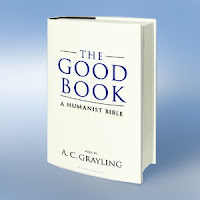 |
| Billy Graham |
The well known Christian evangelist Billy Graham recently wrote an article in response to a question about atheism with the following:
“…atheism has no satisfying answer to the basic questions of life — questions like “Who am I? Where did I come from? Why am I here? How do I know what’s right and wrong? What happens when I die?” Atheism says we are here by chance, and life has no meaning or destiny. Taken to its conclusion, atheism ends in despair.”
As a Humanist minister I couldn’t agree more. Atheism is simply the lack of belief in a deity. This, alone, isn’t the problem, but atheism if it is meant as a ‘worldview’ on its own is, as Graham says, bereft of any answers about who we are, the meaning of life, or how we should live it. I once saw an article that mentioned ‘atheist values’ yet there is no such thing. When an atheist has values, they have taken on something additional to “the lack of theism”. And, without such a guide, most people will indeed find themselves in despair at some point.
That isn’t to say that all atheists are purely and only atheists – even if that is the primary label by which some choose to identify themselves. Humanism is a life philosophy that, like Buddhism, does not include gods. Humanism also has a naturalistic view of reality, but that is not so important as its other features. These include a caring and compassion for others and the realization that making the world a better place and living ethically is intimately connected with achieving happiness in life. Such naturalistic moral philosophies predate the Christian model by centuries and have provided a meaningful basis for millions of lives throughout.
Today, as more and more people leave the ranks of the religious, many of them giving up their supernatural beliefs, I – like Graham - am concerned that many of them will end up in despair. Having a religious background, many may be largely ignorant of the basics of secular ethics or a sense of meaning within a naturalistic framework. But Graham has a different solution to the despair of nothingness. He goes on to say:
“But our hearts cry out for something more — something better and more lasting. Down inside we sense that we aren’t here by chance, nor were we made for this world alone. The reason we feel this way, the Bible says, is because God has put this conviction within us.”
The problem with this approach is that it ignores something else we cry out for by our nature, which is for things to make logical sense to us. I believe one reason for the sharp rise in atheism and agnosticism has been due to the advent of the internet. As people become more aware of the rational and logical issues facing faith-based beliefs, it is more difficult to maintain an unshakable belief in something for which there is no evidence, even if it is attractive to us. Humanism also has within it a humble approach to knowledge and claims, limiting them to what can be rationally validated and shared with others.
Through this methodology Humanism, unlike mere atheism, does tell us how we got here, by accepting the current consensus of those who have put in the hard work of studying the evidence. And, as I’ve recently reviewed in Grayling’s Humanist Bible (book of Genesis), this scientifically informed narrative can be a very beautiful and moving one. Carl Sagan has also exemplified this, with his eloquent and marvelous descriptions of nature. This natural explanation of our origins also illuminates why it is that we feel so attracted to the prospect of a permanent, unchanging, and eternal existence – as a simple manifestation of a strong instinctive urge to survive.
But as I’ve explained before, there are ways to come to terms with the impermanent and uncertain nature of our existence, rather than having to convince ourselves of something which – although it might be true if we are very lucky – we have no real solid basis to claim. Some of these methods hearken back to Buddhism again, some types of which could be considered an Eastern form of Humanism, aside from the cultural colorings and supernatural elements that may have become layered upon it in various regions. It teaches mindfulness, compassion, and learning to love and appreciate the experience of life for what it is in the moment – as an end unto itself – rather than as a means to some other end. Other methods that inspire naturalists include the rational Western ancient philosophies such as the balanced life of Epicureanism and the virtuous equanimity of Stoicism. And, of course, modern philosophy, sociology, and psychology add to the wealth of wisdom on happiness and leading a good life. In more general terms, Spiritual Naturalism (which includes some varieties of Humanism) can provide many approaches along these lines.
Thus, while mere atheism may include all kinds of lifestyles, a healthy Humanism or other variety of Spiritual Naturalism can provide a meaningful and happy life of flourishing. My hope is that both theists and atheists will more greatly appreciate the difference between Humanism and atheism.
Please SUBSCRIBE to DT Strain:
RSS to The Humanist Contemplative
Like DT Strain on Facebook
Follow DT Strain on Twitter
Get new-article text notices on your mobile phone:
text "follow dtstrain" to 40404
RSS to The Humanist Contemplative
Like DT Strain on Facebook
Follow DT Strain on Twitter
Get new-article text notices on your mobile phone:
text "follow dtstrain" to 40404



